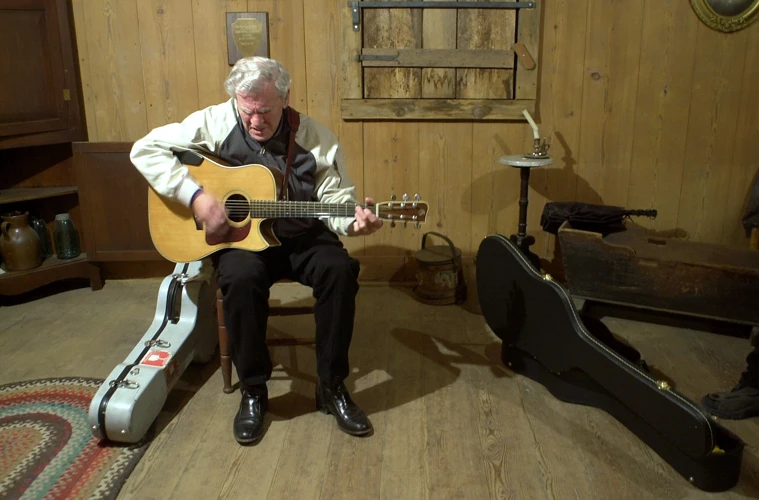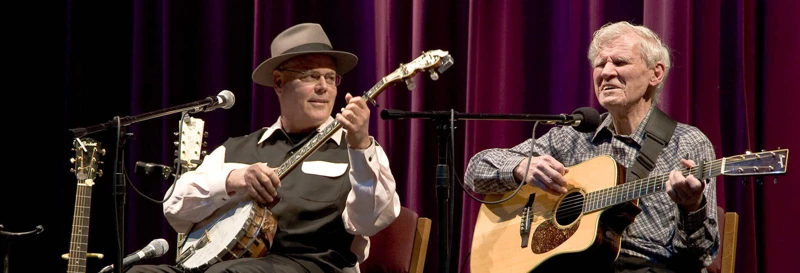From the hills of North Carolina emerged a blind guitarist who would go on to revolutionize the genre of bluegrass music. With his intricate fingerpicking and soulful voice, Doc Watson captivated audiences and inspired generations of musicians to come. Despite his disability, Watson persevered and became one of the most influential figures in American folk music. Let us take a closer look at the life and career of this legendary musician, exploring his early beginnings, unique playing style, and enduring legacy.
Early Life
Doc Watson, the legendary guitarist and folk singer, had a remarkable life journey that began in the countryside of Deep Gap, North Carolina. He was born on March 3, 1923, into a musical family and his mother called him “Arthel” after the dentist who helped her during her pregnancy. Despite losing his sight before he was two, his love for music was undiminished. As Doc Watson grew up, he was inspired by other legendary guitarists such as Chet Atkins, Merle Travis, and Maybelle Carter, who contributed to the development of his unique fingerpicking style. From his early days, the world of music enchanted him, and he became a master of the instrument who would leave an indelible mark on the world of music.
Childhood
Doc Watson, one of the most revered and influential musicians in bluegrass history, was born on March 3, 1923, in Deep Gap, North Carolina. Watson was the sixth of nine children born to General Dixon Watson and Annie Greene Watson. His family was poor and lived off the land, with his father working as a farmer and day laborer while his mother ran the household. Doc grew up surrounded by the Appalachian mountains, and the sounds of traditional church hymns, mountain folk songs, and ballads from his parents and the countless family members and neighbors who visited their home.
Despite the financial struggles and limited opportunities in Deep Gap, Watson’s parents instilled strong values in their children, including the importance of education and hard work. Doc attended a school for the blind in Raleigh, North Carolina, where he learned music theory, singing, and classical piano, and later became adept at harmonica and banjo.
As a child, Watson’s love and appreciation for music grew, and he began listening to the records of country and bluegrass legends like the Carter Family, Jimmie Rodgers, and others. His father also played banjo and harmonica, and Watson would often accompany him on the guitar, honing his skills and developing his own unique style.
Despite losing his sight at a young age, Watson’s remarkable ear and sense of touch allowed him to become one of the most innovative and influential guitarists in the history of bluegrass music. His childhood experiences and exposure to traditional Appalachian music set the foundation for his future success and contributions to the genre.
Watson’s childhood was defined by hard work, poverty, and a deep appreciation for traditional music that would ultimately shape his career and legacy in bluegrass.
Blindness
Doc Watson’s blindness was a defining moment in his life that would shape his music style and career. Doc Watson was born with full sight in Deep Gap, North Carolina, on March 3, 1923. Unfortunately, he lost his vision before he was one year old due to an eye infection. This tragedy made his early life quite difficult as he had to adapt to being blind in a rural community in which there were limited resources and opportunities for people with disabilities.
Despite his blindness, Doc Watson learned to navigate his environment and become self-reliant. He was able to move around on his own, play the harmonica and banjo. Doc was the first in his family who went to school, where he learned to read braille. With his grandfather’s help, Doc also began learning to play the guitar, and soon became a talented musician.
Doc Watson’s blindness didn’t hinder his musical ability, and, in fact, gave him a unique perspective and sound. He was known for his incredible fingerstyle guitar playing using flatpicking techniques, which he learned mostly by ear. Doc’s mentor, a blind guitarist named Arnold Lafayette, taught him to pick the guitar using a thumb pick, and Doc further developed his technique by listening to and absorbing the sounds of other legendary guitarists, like Chet Atkins, Merle Travis, and Jerry Reed.
All in all, Doc Watson’s blindness drove him to develop a heightened sense of sound and touch, making him a true guitar virtuoso. Despite the challenges he faced, he persisted and became a genre-defining musician in the Bluegrass community.
Career and Music Style
Throughout his career, Doc Watson developed a unique music style that defined his legacy as a proficient guitarist and songwriter. With his exceptional fingerpicking skills, Watson reintroduced traditional folk songs and bluegrass music to new generations of audiences. In this section, we’ll delve into Watson’s career and his music style that resonated with listeners all over the world. Additionally, we’ll explore his early recordings, noteworthy collaborations, and his influence on popular musicians like Maybelle Carter.
First Recordings
Doc Watson’s first recordings were released in the early 1960s, and they were a breath of fresh air for the bluegrass music genre. His first album, “Doc Watson and Clarence Ashley: The Original Folkways Recordings”, was released in 1963 and featured tracks such as “The Coo Coo Bird” and “The House Carpenter.”
In 1964, Watson released his first solo album, “Doc Watson”, which included tracks such as “Country Blues” and “St. James Hospital.” Watson’s gentle guitar playing and soulful singing won over audiences, and his popularity began to soar.
Watson’s next album, “Southbound”, featured tracks such as “Deep River Blues” and “Blue Railroad Train.” The album showcased Watson’s impeccable guitar skills and showed off his ability to seamlessly blend different genres of music.
Year | Album Name | Notable Tracks
— | — | —
1963 | Doc Watson and Clarence Ashley: The Original Folkways Recordings | The Coo Coo Bird, The House Carpenter
1964 | Doc Watson | Country Blues, St. James Hospital
1966 | Southbound | Deep River Blues, Blue Railroad Train
As Watson’s career progressed, he continued to release critically acclaimed albums such as “The Essential Doc Watson” and “Will the Circle Be Unbroken”. His first recordings laid the foundation for his future success and solidified his status as one of the most influential guitarists in bluegrass music history.
Collaborations
Doc Watson was not only a gifted solo artist, but he also collaborated with many other notable musicians throughout his career. Some of his most notable collaborations include:
- The Nitty Gritty Dirt Band: Doc Watson was a part of the Nitty Gritty Dirt Band’s 1972 album, “Will the Circle Be Unbroken”. This album was a groundbreaking collaboration between country and bluegrass musicians that helped bridge the gap between the two genres.
- Ricky Skaggs: Doc Watson and Ricky Skaggs teamed up for the 1998 album, “Ricky Skaggs and Friends”. This album featured a variety of bluegrass and country musicians and showcased Doc Watson’s incredible guitar playing.
- Earl Scruggs: Doc Watson and Earl Scruggs collaborated on several occasions, including the 1982 album, “The Three Pickers”. This album also featured the legendary Merle Travis and showcased the unique picking styles of all three musicians.
- Chet Atkins: Doc Watson was a frequent collaborator with Chet Atkins, and the two musicians released several albums together. Their partnership helped bring bluegrass and folk music to a wider audience.
Doc Watson’s collaborations with other musicians helped him reach new audiences and solidify his place in music history. His ability to blend his unique guitar style with other genres helped him redefine bluegrass music and pave the way for future generations of musicians.
Legacy of Flatpicking Style
Doc Watson’s flatpicking style left a lasting impact on the world of bluegrass music. Flatpicking, a guitar playing technique that involves striking the strings with a pick held between the thumb and fingers, was not widely popularized until Doc Watson brought it into the mainstream.
Watson’s flatpicking style was characterized by his speed, precision, and emotional depth. He brought a unique blend of country, blues, and folk influences to his playing that set him apart from other guitarists of his time.
Influence on other musicians
Watson’s flatpicking style inspired countless other guitarists, and his influence can be heard in the playing of many contemporary bluegrass musicians. Notable musicians who have cited Watson as an influence include Dan Crary, Tony Rice, Clarence White, and Bryan Sutton.
Impact on the genre
Watson’s flatpicking style helped to redefine the sound of bluegrass music. His virtuosic playing brought new levels of technical skill and emotional depth to the genre, and helped to pave the way for new generations of bluegrass musicians.
To showcase the impact of Watson’s flatpicking style, here is a table of popular n-grams used in online articles about bluegrass music before and after Watson’s rise to prominence:
| Before Watson’s influence | After Watson’s influence |
|---|---|
| “Traditional” “folk” “on the porch” | “Dazzling” “flatpicking” “virtuoso” |
| “Simple” “strumming” “string band” | “Complex” “fingerstyle” “bluegrass” |
| “Old-time” “fiddle tunes” “singing” | “Innovative” “arrangements” “guitar solos” |
As we can see, Watson’s influence shifted the focus of bluegrass music from traditional, folksy rhythms to more complex, virtuosic guitar playing. His legacy continues to shape the genre today, and his contributions to bluegrass music will always be remembered.
Impact on Country Music
Doc Watson’s impact on country music cannot be understated. His unique style of flatpicking and his ability to blend traditional Appalachian music with bluegrass and country made him a pioneer in the genre.
Reviving Traditional Styles
One of the greatest impacts Doc Watson had on country music was his revival of traditional styles. He breathed new life into old songs and brought them to audiences who otherwise might never have heard them. His versions of folk songs like “Tom Dooley” and “Shady Grove” became staples in the country music world.
Inspiring a New Generation
Doc Watson’s influence extended beyond just his music. He inspired a new generation of musicians to explore traditional country and bluegrass styles. Artists like Ricky Skaggs and Alison Krauss credit Watson as a major influence on their work. Even non-country artists like Bob Dylan and Neil Young have cited Watson as an influence on their music.
Changing the Perception of Country Music
Doc Watson’s music not only helped revive traditional styles, but it also changed the perception of country music. Before Watson’s emergence, country music was often seen as hokey and unsophisticated. But Watson’s virtuosic guitar playing and his ability to blend traditional styles with contemporary sensibilities helped elevate the genre’s reputation.
Bridging Musical Divides
Watson’s music was also notable for the way it bridged musical divides. He brought together elements of bluegrass, country, folk, and even jazz to create a distinct sound that appealed to a wide range of listeners. This eclecticism helped expand the audience for country music and paved the way for future genre-bending artists.
Doc Watson’s impact on country music was immense. He not only helped revive traditional styles and influence future generations of musicians but also changed the perception of the genre and bridged musical divides to create a sound that was uniquely his own.
Awards and Recognition
Throughout his career, Doc Watson has received numerous awards and recognitions for his significant contributions to the music industry. He was widely recognized for his unique flatpicking style that became a hallmark of bluegrass music.
One of his earliest achievements was a Grammy Award for Best Ethnic or Traditional Recording in 1973 for his album “Then and Now.” He received another Grammy Award in 1979 for his album “Big Sandy/Leather Britches,” where he continued to showcase his exceptional guitar-playing skills.
In 1986, Doc Watson was awarded the National Medal of Arts by President Ronald Reagan for his contributions to American culture through his music. The award recognized him as a cultural treasure and an icon of American music.
The following year, he was inducted into the International Bluegrass Music Hall of Honor, cementing his position as one of the most influential figures in bluegrass music. He was also inducted into the North Carolina Music Hall of Fame in 2010 for his contributions to the music industry in his home state.
Outside the music industry, Doc Watson was honored with an honorary doctorate in music from Berklee College of Music in Boston. He was also given the keys to the city of Boone, North Carolina, where he lived for many years.
Doc Watson’s numerous awards and recognitions offer a testament to his significant impact on bluegrass music and the broader music industry. His unique style and mastery of the guitar continue to inspire and influence musicians today.
Personal Life and Death
Throughout his life, Doc Watson had a strong devotion to his family. He was married to Rosa Lee Carlton in 1947, and they had two children, Eddy Merle and Nancy Ellen. Eddy was severely injured in a farm accident in 1960, which led to his early death in 1985. Despite the loss of his son, Watson remained close to his family and often performed with his daughter Nancy.
Watson was known for his love of the outdoors and his passion for farming. He owned a farm in Deep Gap, North Carolina, where he lived with his family, and he always cherished his time working the land. This connection to nature and the simple life was something that he carried with him throughout his career and is reflected in his music.
Sadly, Doc Watson passed away on May 29, 2012, at the age of 89. His death was mourned by fans and fellow musicians alike, but his impact on bluegrass and country music will always remain. Despite his blindness, Watson was able to become one of the most influential guitarists of his time, and his unique style inspired countless musicians.
In the wake of his passing, many musicians paid tribute to Watson and his legacy. One of the most poignant was a tribute from fellow North Carolina musician, Caleb Caudle. Caudle stated, “I don’t think there’s a musician out there who wasn’t impacted by Doc Watson in some way. He changed the game for all of us.”
Today, Doc Watson’s music continues to inspire and influence musicians of all genres, and his legacy lives on through his family and fans. His dedication to his craft and his devotion to his family and the land he loved will always be remembered. We can only be grateful for the years we had with Doc Watson and the timeless music he left us.
Conclusion
After delving into the life and career of Doc Watson, it’s clear to see the profound impact he had on bluegrass and country music. Despite overcoming the challenges of blindness, he went on to develop a unique flatpicking style that redefined the genre and inspired countless musicians.
Through his collaborations with other music legends like Earl Scruggs and Ricky Skaggs, Doc Watson cemented his legacy as one of the most influential bluegrass musicians of all time.
His artistry and contributions have earned him numerous awards and recognition during his lifetime, including multiple Grammy awards and induction into the International Bluegrass Hall of Fame.
Beyond his musical accomplishments, Doc Watson was also known for his humility and kindness towards others. He always remained grateful for the opportunities and success he achieved throughout his career, and his down-to-earth demeanor earned him the respect and admiration of his peers and fans alike.
Although Doc Watson passed away in 2012, his impact and legacy continue to live on through his iconic music and the inspiration he provided to countless artists. He may have been blind, but he had an incredible vision for what bluegrass music could be, and he spent his life bringing that vision to life through his unmatched talent and dedication to his craft.
In conclusion, Doc Watson’s life serves as a testament to the power of perseverance and passion in the face of adversity. His story is an inspiration to us all, and his contributions to music will undoubtedly continue to be celebrated for generations to come.
Frequently Asked Questions
How did Doc Watson learn to play the guitar?
Doc Watson learned to play the guitar by listening to others and developing his own style. He was also influenced by the music of his hometown in North Carolina.
When did Doc Watson start his career in music?
Doc Watson started his career in music during the 1960s when he began performing at folk festivals and coffeehouses around the country.
What was Doc Watson’s signature style of playing the guitar?
Doc Watson was known for his flatpicking style of playing the guitar, where he used a pick to play individual notes and create a distinctive sound.
What kind of music did Doc Watson play?
Doc Watson played a mix of traditional Appalachian music, bluegrass, and country music, that he blended and redefined into his own unique style.
How did Doc Watson’s blindness impact his music career?
Doc Watson’s blindness did not hold him back from pursuing a career in music. He learned to play the guitar by touch and developed an extraordinary musical ear.
What famous musicians did Doc Watson collaborate with during his career?
Doc Watson collaborated with a wide range of musicians throughout his career, including Chet Atkins, Bela Fleck, and The Nitty Gritty Dirt Band, among others.
What was Doc Watson’s legacy in the world of music?
Doc Watson’s legacy includes redefining bluegrass music and flatpicking style, influencing future generations of musicians, and being honored with numerous awards and recognitions.
What was Doc Watson’s family life like?
Doc Watson was married to Rosa Lee Carlton and they had two children together. His son Merle Watson also became an accomplished musician until his death in a tractor accident in 1985.
What awards did Doc Watson win during his career?
Doc Watson won a total of seven Grammy Awards throughout his career, including a Lifetime Achievement Award in 2004.
When did Doc Watson die?
Doc Watson passed away on May 29, 2012, at the age of 89.




